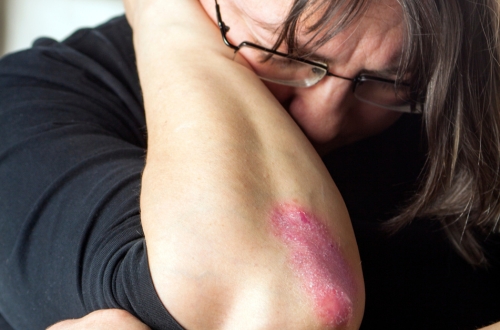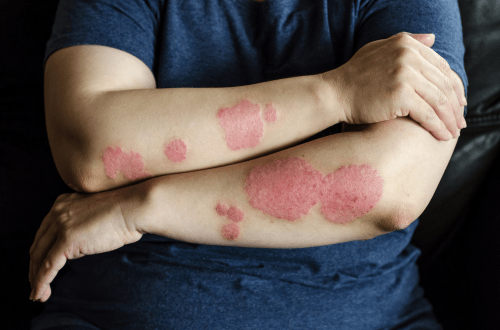The Emotional Impact of Psoriasis: Addressing Mental Health
For the last decade, the International Foundation of Psoriasis Associations (IFPA) has hosted World Psoriasis Day each year on October 29th across 70 countries, raising awareness across the global community in support of people living with psoriatic disease. Psoriasis is a chronic immune-mediated skin disease in which overactive immune cells cause an excessive production of skin cells. As of 2019, there were over 4.6 million individuals living with psoriasis worldwide, with the highest incidence rates being in those aged 40-65 years.
For the 2024 campaign, the IFPA is promoting the theme of “Family,” in recognition of the challenges psoriatic disease presents for patients’ family economy, work life, social life, relationships, and more. TFS HealthScience’s Dermatology CRO (Contract Research Organization) is among several organizations joining the IFPA’s efforts to highlight the often overlooked and underestimated emotional toll that psoriasis can take on patients and their families.
In honor of World Psoriasis Day 2024, this article highlights the psychological burden of psoriasis and the importance of prioritizing mental health support for those affected by this chronic condition. Our discussion will also explore strategies for managing mental health alongside psoriasis treatment, as well as key resources which can help empower patients and their families. Read on to learn more!
When Psychology and Dermatology Intersect: The Emotional Burden of Psoriasis
Psoriasis is characterized by thickened, dry patches of inflamed, scaly skin which can affect any part of the body, but typically presents on the scalp, elbows, or knees. Beyond being linked to secondary comorbidities such as dyslipidemia, hypertension, diabetes, and more, psoriasis is associated with higher rates of depression and suicidal ideation than those reported in the general population. Psoriatic patients also face problems at work, difficulties with interpersonal relationships and intimacy, as well as impaired self-esteem.
The Emotional Impact of Psoriasis : Survey Findings from the National Psoriasis Foundation
In a survey conducted by the National Psoriasis Foundation (NPF) between 2003 and 2011, psoriasis was reported to affect overall emotional well-being in 88% of patients and enjoyment of life in 82% of patients. The vast majority of patients perceived their appearance as unsightly (65%) and felt self-conscious about having psoriasis (73%). The primary reasons driving these invisible psychosocial challenges stemmed from public misconceptions and stigma surrounding the disease, especially considering the visible nature of this condition. Another survey by the NPF asked over 1000 participants about their perceptions of psoriasis. Notably, 50% of respondents reported practicing discriminatory behavior toward patients with psoriasis (e.g., being reluctant to shake hands [28.8%]), 16.5% believed the disease is contagious, and 6.8% believed it to be a result of poor personal hygiene.
Read the published review here for more details.
Characterizing the Mental Health Burden of Psoriatic Patients
Psoriasis is a chronic condition with disease activity suddenly worsening or becoming dormant in back-and-forth cycles each time. Especially during flare-ups, patients may experience increased anxiety, loss of sleep, more intense depressive symptoms, and general emotional exhaustion from facing challenges in daily life, such as in social situations or when wearing certain types of clothing. These consequences, coupled with the unpredictability of flare-ups, can contribute to feelings of hopelessness and despair. The stigma associated with the disease can also cause patients to gradually withdraw from social activities or avoid personal relationships out of fear of rejection or judgment. The emotional toll of these psychosocial factors creates a loop that further exacerbates symptoms of mental health struggles such as anxiety, depression, and social isolation.
Learn more about the burden of depression in psoriasis patients in this published review.
Strategies for Managing Mental Health with Psoriasis
Dermatological diseases are visible conditions by nature, often coming with a heavy emotional burden, and clinicians must address psychological comorbidities as proactively as treating the physical symptoms. Several methods have been validated to treat mental health conditions and can be applied in psoriatic patients to manage common psychosocial challenges.
One such method is cognitive-behavioral therapy (CBT), which can help patients identify and challenge negative thought patterns related to their condition. CBT is a proven treatment for depression and can provide tools for managing associated stress and anxiety, ultimately improving overall well-being. In 2023, an 8-week pilot study led by Megan Noe, M.D., was launched to investigate if adults with psoriasis and depression symptoms find a smartphone-based CBT program to be acceptable and practical to use. The information learned in this study will help to design a larger study to explore the effectiveness of smartphone-based CBT to improve the symptoms of depression and psoriasis. The study was expected to have ended by July 2024.
Read more details about this pilot study here.
Mindfulness and meditation practices have also shown promise in reducing stress and improving quality of life for psoriasis patients. Stress is a known contributing factor to flare-ups, but these methods can promote relaxation and alleviate psoriasis-related discomfort. Regularly practicing mindfulness and guided meditation can ultimately help individuals develop a more accepting and compassionate attitude towards their bodies and symptoms, in addition to developing resilience and healthier coping skills.
Another key approach involves helping psoriatic patients build their social support network through local support groups. These groups offer valuable opportunities for these individuals to connect with others who understand their experiences, reducing feelings of isolation and providing a platform for sharing additional coping strategies. Connecting with family and friends can also provide emotional support and encouragement.
Visit this page for additional strategies for psoriatic patients to find a community in-person and online.
Many patients with severe psoriasis may benefit from closely working with a dermatologist and a trained mental health professional. In certain cases, medications such as antidepressants or anti-anxiety medications could help manage chronic mental health comorbidities, but this should be discussed in detail with a healthcare provider. Furthermore, patients can reap benefits from adopting lifestyle modifications such as regular exercise, a balanced diet, and prioritizing sleep for both their psoriasis and mental well-being.
Empowering Patients with Psoriasis: Key Resources and Approaches
It is important for patients to recognize that seeking help for mental health concerns is a sign of strength, not weakness, and is a crucial component of comprehensive psoriasis treatment. Several organizations recognize the significant psychosocial burden experienced by these patients and offer resources to help empower them to take an active role in their mental health and long-term well-being.
- The National Psoriasis Foundation offers a wealth of resources, including educational materials, support group listings, and a helpline for personalized assistance.
- The American Academy of Dermatology provides patient education resources and can help individuals find dermatologists who specialize in psoriasis care.
- For mental health support, organizations like the Anxiety and Depression Association of America offer information specific to chronic health conditions.
- Patients can also benefit from mobile apps designed for mental health management, such as Headspace for meditation or Moodfit for mood tracking and CBT exercises.
Patients can also take up journaling or other creative activities to help process emotions related to daily life challenges and symptoms of psoriasis flare-ups. Overall, healthcare providers and mental health professionals should provide a safe space that encourages psoriatic patients to communicate openly about their needs and challenges.
Conclusion
In conclusion, psoriasis carries a significant emotional burden for patients and clinicians must consider it a critical aspect of the condition that requires appropriate attention and care. By recognizing the proven link between physical symptoms with this dermatological disease and mental health, patients and their physicians can build a more tailored, comprehensive treatment regimen. The combination of pharmaceutical psoriasis therapies, psychological support, and self-care methods can help individuals living with this chronic disease better build their confidence and emotional well-being. As we approach World Psoriasis Day this October 29, join TFS Dermatology CRO and the IFPA in our commitment to raising awareness about the mental health aspects of psoriasis and supporting those affected in their journey towards better quality of life.
TFS Dermatology CRO: An Industry Leader in Psoriasis Research
TFS HealthScience is a global CRO with an established foothold in therapeutic research and clinical trials for widespread skin diseases such as psoriasis. Our team of experts support biotechnology and pharmaceutical companies throughout their entire clinical development journey with dermatology trials. Visit our dedicated Dermatology CRO website to learn more about the expertise TFS can offer for your next dermatology clinical trial or connect with a TFS representative today!
Interested in more dermatology content from us? Visit the TFS Intellect Hub to access the latest articles, white papers, case studies, and more!
Connect with Us
Contact us today to discover how TFS can be your strategic CRO partner in clinical development.


